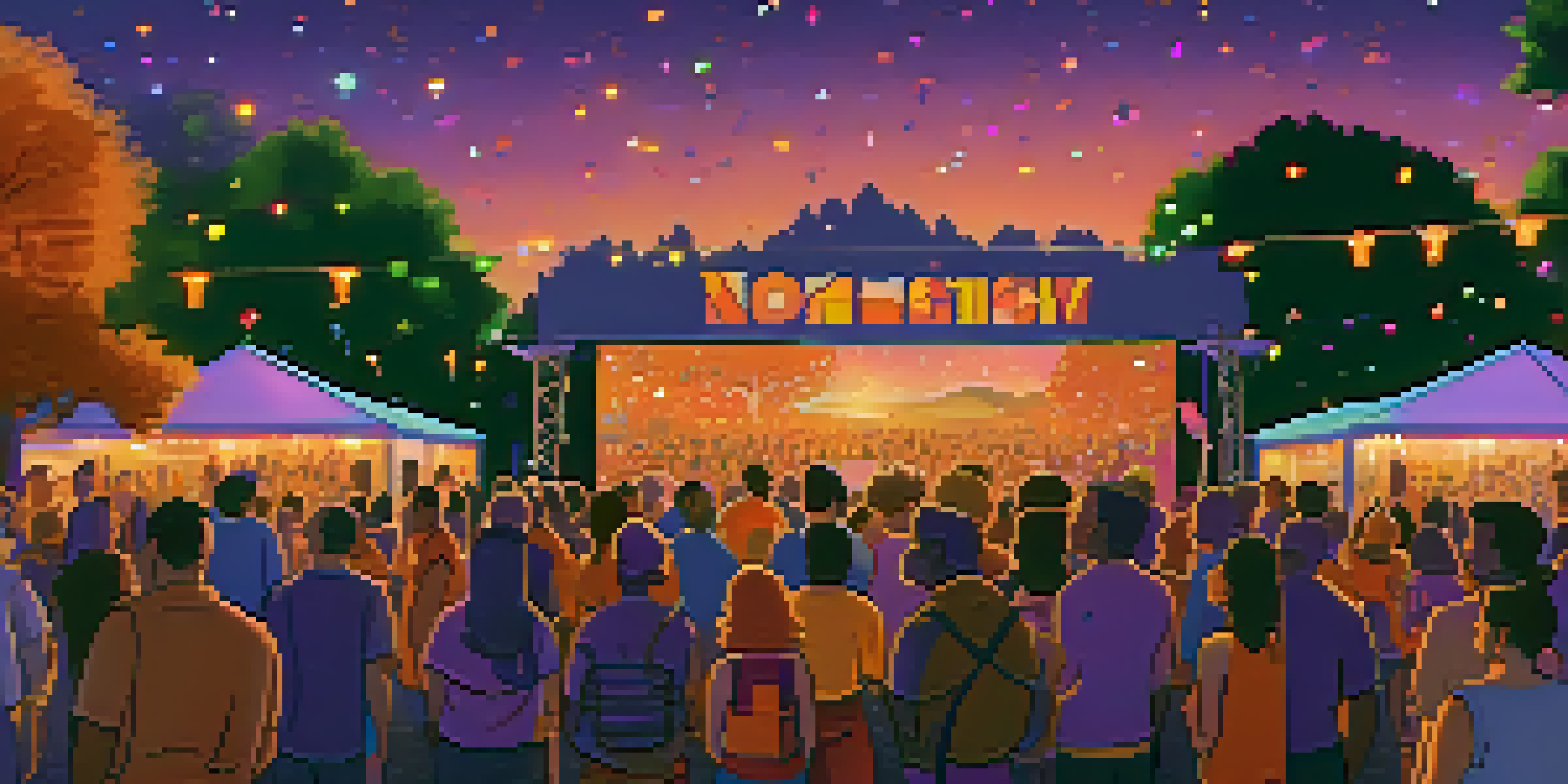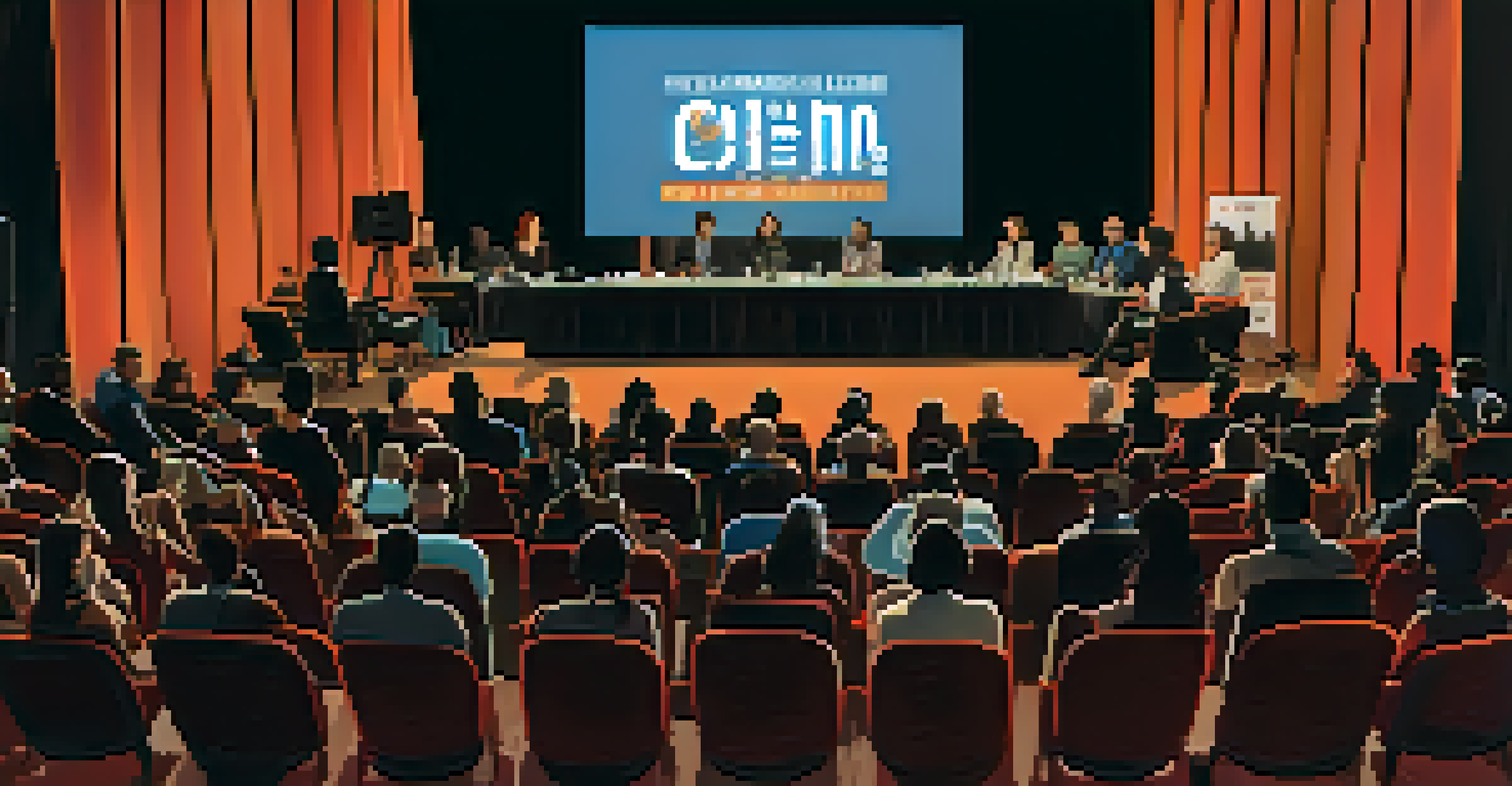Film Festivals: A Launchpad for Diverse Voices in Cinema

The Role of Film Festivals in Cinema
Film festivals have long served as pivotal platforms for filmmakers to showcase their work. From Sundance to Cannes, these events are not just about glitz and glamour; they foster a sense of community and creativity. They provide a space where independent filmmakers can connect with audiences and industry professionals, often leading to groundbreaking opportunities.
Film festivals are a celebration of the art of cinema and the diverse voices that create it.
These festivals are crucial for bringing attention to unique stories that might otherwise remain unheard. By focusing on independent and international films, they highlight narratives that challenge mainstream perspectives. This diversity enriches the cinematic landscape, offering viewers a broader understanding of different cultures and experiences.
Moreover, film festivals often celebrate emerging talent, giving fresh voices a chance to shine. They act as a launchpad for filmmakers who may not have access to traditional distribution channels. In this way, festivals play an essential role in shaping the future of cinema.
Spotlighting Underrepresented Filmmakers
One of the most significant impacts of film festivals is their commitment to highlighting underrepresented filmmakers. Many festivals now prioritize diversity in their programming, showcasing works by women, people of color, and LGBTQ+ creators. This intentional focus helps to challenge the status quo and push for greater representation within the industry.

For instance, festivals like the African American Film Festival and the Toronto International Film Festival have dedicated sections for films that amplify these voices. By creating spaces where diverse stories are told, these festivals not only entertain but also educate audiences about various social issues and perspectives. This is crucial in a world where understanding and empathy are more important than ever.
Film Festivals as Community Hubs
Film festivals provide a vital space for filmmakers to connect with audiences and industry professionals, fostering creativity and collaboration.
As a result, many filmmakers have found a supportive community at these festivals, allowing them to share their unique experiences and viewpoints. This sense of belonging can be incredibly empowering, inspiring budding filmmakers to pursue their dreams with confidence.
Cultivating Global Perspectives Through Film
Film festivals serve as a bridge between cultures, inviting filmmakers from around the world to share their stories. This global exchange enriches festival lineups, allowing audiences to experience films that reflect a variety of cultural backgrounds. By watching these films, viewers gain insights into lives and societies that differ from their own.
The power of film is to inspire and to create dialogue around the issues that matter most.
For example, the Berlin International Film Festival showcases a vast array of films from various countries, often sparking discussions around international issues. Such exposure can open up conversations about global challenges like climate change, migration, and inequality. It encourages audiences to think critically about their place in the world and how they relate to others.
Through these cross-cultural exchanges, film festivals not only entertain but also foster a sense of unity among diverse audiences. They remind us that while our experiences may differ, the human experience is universal, transcending borders and cultures.
Nurturing Emerging Talent and New Voices
Many film festivals have programs specifically designed to support emerging filmmakers. These initiatives often include mentorship opportunities, workshops, and networking events that help new talents hone their craft. By providing these resources, festivals play a crucial role in nurturing the next generation of storytellers.
For instance, the Tribeca Film Festival offers a variety of programs aimed at young filmmakers, encouraging them to explore their creativity. Such support can make a significant difference, as many aspiring filmmakers lack the resources or guidance needed to navigate the complex film industry. Festivals can empower them to take bold steps toward their filmmaking goals.
Empowering Diverse Voices in Film
By prioritizing underrepresented filmmakers, festivals challenge the status quo and enrich the cinematic landscape with diverse narratives.
As these emerging voices gain recognition, they often bring fresh perspectives and innovative storytelling techniques to the forefront. This influx of new talent revitalizes the industry and keeps audiences engaged with original content that pushes boundaries.
Fostering Dialogue Through Film
Film festivals are not just about screenings; they also serve as platforms for dialogue and discussion. Many festivals host panels and Q&A sessions with filmmakers, allowing audiences to engage directly with the creators of the films. This interaction can deepen viewers’ understanding of the themes and messages presented on screen.
These discussions often touch on pressing social issues, prompting audiences to reflect on their own beliefs and values. For example, a documentary about climate change might lead to a lively conversation about environmental responsibility. Such dialogues are vital in a world where film can spark change and inspire action.
By fostering these conversations, festivals contribute to a culture of awareness and activism. They empower audiences to not only consume content but also think critically about the world around them and their role in it.
The Impact of Technology on Film Festivals
In recent years, technology has transformed the way film festivals operate, making them more accessible to a global audience. Virtual screenings and online festivals have allowed filmmakers to share their work without geographical limitations. This shift has opened up new opportunities for diverse voices to be heard.
For example, during the pandemic, many festivals pivoted to online formats, allowing audiences from all over the world to participate. This accessibility has democratized the festival experience, enabling more people to discover and engage with films that resonate with them. It also allows filmmakers from underrepresented backgrounds to reach wider audiences than ever before.
Technology's Role in Accessibility
The rise of virtual screenings has made film festivals more accessible, allowing a broader audience to engage with diverse stories from around the world.
However, while technology has its benefits, it also presents challenges in terms of audience engagement and connection. The key for festivals moving forward will be to find a balance between traditional and digital formats, ensuring that the spirit of community and interaction remains intact.
Celebrating the Future of Diverse Cinema
As we look to the future, the role of film festivals in celebrating diverse voices in cinema seems more important than ever. With ongoing conversations about representation and inclusion in the industry, festivals can be at the forefront of promoting change. They can continue to serve as platforms where stories that reflect the rich tapestry of human experience are told.
This commitment to diversity not only enriches the film industry but also empowers audiences worldwide. When people see themselves represented on screen, it fosters a sense of belonging and validation. It also encourages empathy and understanding among different communities, bridging divides and creating connections.

Ultimately, film festivals are not just events; they are movements that celebrate the power of storytelling. By amplifying diverse voices, they help shape a more inclusive cinematic landscape, inspiring future generations of filmmakers and audiences alike.